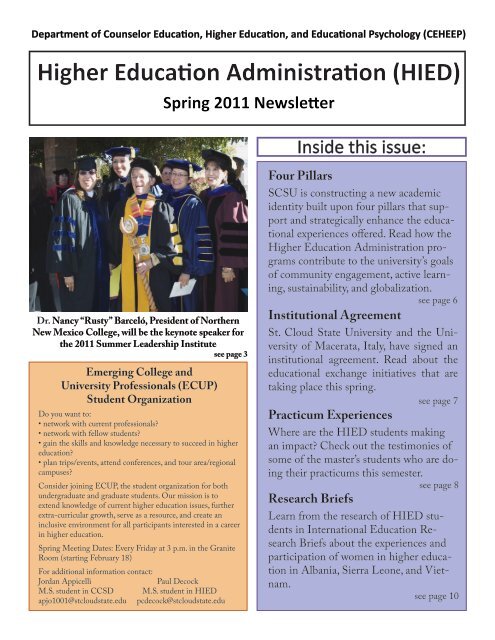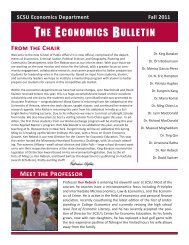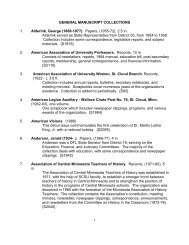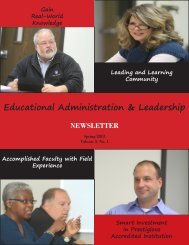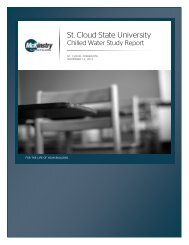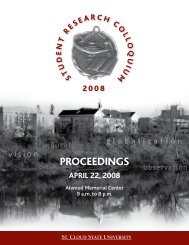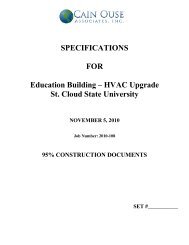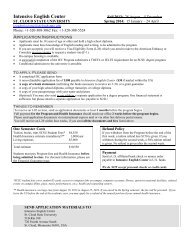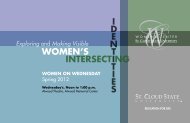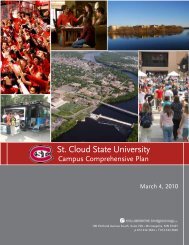Inside this issue: - St. Cloud State University
Inside this issue: - St. Cloud State University
Inside this issue: - St. Cloud State University
You also want an ePaper? Increase the reach of your titles
YUMPU automatically turns print PDFs into web optimized ePapers that Google loves.
Department of Counselor Education, Higher Education, and Educational Psychology (CEHEEP)<br />
Spring 2011 Newsletter<br />
<strong>Inside</strong> <strong>this</strong> <strong>issue</strong>:<br />
Dr. Nancy “Rusty” Barceló, President of Northern<br />
New Mexico College, will be the keynote speaker for<br />
the 2011 Summer Leadership Institute<br />
see page 3<br />
Emerging College and<br />
<strong>University</strong> Professionals (ECUP)<br />
<strong>St</strong>udent Organization<br />
Do you want to:<br />
• network with current professionals?<br />
• network with fellow students?<br />
• gain the skills and knowledge necessary to succeed in higher<br />
education?<br />
• plan trips/events, attend conferences, and tour area/regional<br />
campuses?<br />
Consider joining ECUP, the student organization for both<br />
undergraduate and graduate students. Our mission is to<br />
extend knowledge of current higher education <strong>issue</strong>s, further<br />
extra-curricular growth, serve as a resource, and create an<br />
inclusive environment for all participants interested in a career<br />
in higher education.<br />
Spring Meeting Dates: Every Friday at 3 p.m. in the Granite<br />
Room (starting February 18)<br />
For additional information contact:<br />
Jordan Appicelli<br />
Paul Decock<br />
M.S. student in CCSD M.S. student in HIED<br />
apjo1001@stcloudstate.edu pcdecock@stcloudstate.edu<br />
Four Pillars<br />
SCSU is constructing a new academic<br />
identity built upon four pillars that support<br />
and strategically enhance the educational<br />
experiences offered. Read how the<br />
Higher Education Administration programs<br />
contribute to the university’s goals<br />
of community engagement, active learning,<br />
sustainability, and globalization.<br />
see page 6<br />
Institutional Agreement<br />
<strong>St</strong>. <strong>Cloud</strong> <strong>St</strong>ate <strong>University</strong> and the <strong>University</strong><br />
of Macerata, Italy, have signed an<br />
institutional agreement. Read about the<br />
educational exchange initiatives that are<br />
taking place <strong>this</strong> spring.<br />
see page 7<br />
Practicum Experiences<br />
Where are the HIED students making<br />
an impact? Check out the testimonies of<br />
some of the master’s students who are doing<br />
their practicums <strong>this</strong> semester.<br />
see page 8<br />
Research Briefs<br />
Learn from the research of HIED students<br />
in International Education Research<br />
Briefs about the experiences and<br />
participation of women in higher education<br />
in Albania, Sierra Leone, and Vietnam.<br />
see page 10
Higher Education Administration Newsletter Page 2<br />
Editors<br />
Dr. Gabriela J. Silvestre<br />
Assistant Professor of HIED<br />
Alvaro J. Marmolejo Davis<br />
Ed.D. <strong>St</strong>udent and HIED G.A.<br />
SCSU Reorganization<br />
For over a year, the faculty and staff of SCSU have been<br />
engaged in program review and administrative consolidation.<br />
While these activities continue, some decisions<br />
have been made and the impact on the higher education<br />
administration programs is becoming clearer.<br />
The College of Education will be renamed the School<br />
of Education. The current home department of the<br />
higher education programs, the CEHEEP Department,<br />
will be re-structured and the counseling programs that<br />
were part of that department will become part of the<br />
new School of Health and Human Services. The higher<br />
education programs will join with the K-12 administration<br />
programs in a new department within the School of<br />
Education.<br />
The name of the new department has not been determined<br />
yet. We will let you know the new department’s<br />
name. All these changes are at the administrative level,<br />
but the doctoral and masters programs are operating<br />
much as they have in the past, so we hope that the student<br />
experience will be largely unaffected.<br />
Ed.D. Director<br />
Dr. Michael R. Mills<br />
With the start of the new, spring term Michael Mills<br />
has reassumed the Program Director duties for the doctoral<br />
program. The change is to insure that the faculty<br />
member with the most time to devote to the program<br />
takes on the coordinator role. Christine Imbra deserves<br />
the appreciation of all of us for the job she has done as<br />
coordinator during <strong>this</strong> past fall term.<br />
Dr. Michael R. Mills<br />
Table of Contents<br />
Summer Leadership<br />
Institute..............................Page 3<br />
HIED Updates.................... Page 4<br />
Faculty Updates...................Page 5<br />
Education Abroad<br />
Scholarships.......................Page 5<br />
Announcements.................. Page 5<br />
Upcoming Conferences<br />
Conference Proposals Meeting<br />
CEHEEP Spring Showcase<br />
Practicum Poster Session Meeting<br />
HIED Facebook Page<br />
HIED’s Contributions<br />
to SCSU’s Four Pillars..........Page 6<br />
<strong>St</strong>. <strong>Cloud</strong> <strong>St</strong>ate <strong>University</strong><br />
and <strong>University</strong> of Macerata<br />
Agreement...........................Page 7<br />
Prof.ssa Paola Nicolini Visits SCSU<br />
Education Abroad Trip to Italy<br />
Higher Education<br />
Practicum Experiences.........Page 8<br />
Thesis..................................Page 9<br />
Research Briefs...................Page 10<br />
Scholarly Events.................Page 12
Higher Education Administration Newsletter Page 3<br />
Summer Leadership Institute (SLI)<br />
SLI Schedule<br />
8:30 - 9:00 a.m. Registration<br />
Continental Breaksfast<br />
Attendees listening to Dr. Pamela Eddy’s keynote during the 2010<br />
Summer Leadership Institute. Dr. Eddy is an Associate Professor of<br />
Higher Education at The College of William and Mary.<br />
Save the date!<br />
Third Annual<br />
Summer Leadership Institute<br />
for Women in Higher Education<br />
“Female Leaders Embracing<br />
Diversity in Higher Education”<br />
June 22, 2011<br />
8:30 a.m. - 4:30 p.m.<br />
<strong>St</strong>. <strong>Cloud</strong> <strong>St</strong>ate <strong>University</strong><br />
More information coming soon:<br />
http://www.stcloudstate.edu/hied/summerinstitute.asp<br />
9:00-10:15 a.m. Opening Welcome<br />
Keynote Address<br />
10:30-11:45 a.m. Break Out Sessions<br />
- The <strong>St</strong>atus of Diversity in Higher Education<br />
- Internationalization of Higher Education<br />
12:00-12:30 p.m. Lunch<br />
12:30-1:15 p.m. Speed Networking<br />
1:30-2:45 p.m. Breakout Sessions:<br />
- Social Justice on Campus<br />
- Creating a Supportive and Welcoming<br />
Campus Environment for Under-represented<br />
Women<br />
3:00-4:30 p.m. Dessert Reception<br />
Panel:<br />
- Generational Diversity Amongst Female<br />
Administrators<br />
Keynote Speaker<br />
Nancy “Rusty” Barceló<br />
President, Northern New Mexico College<br />
Dr. Barceló is a pioneer for multiculturalism with over 30 years of experience<br />
in higher education. Prior to the presidency, Dr. Barceló held<br />
several executive positions in higher education, including Vice President<br />
and Vice Provost for Equity and Diversity at the <strong>University</strong> of<br />
Minnesota and Vice President for Minority Affairs and Diversity at<br />
the <strong>University</strong> of Washington.<br />
Dr. Barceló is credited as the moving force behind the National Initiative<br />
for Women in Higher Education (NIWHE). In 2004, she received<br />
the Ohtli award, a special recognition presented by the Mexican government<br />
to Mexicans or Latinos whose work has benefited Mexicans<br />
living abroad.<br />
Dr. Barceló holds a B.A. in Social Work from Chico <strong>St</strong>ate <strong>University</strong>,<br />
a M.A. in Recreational Education from the <strong>University</strong> of Iowa, and<br />
a Ph.D. in Higher Education Administration from the <strong>University</strong> of<br />
Iowa, from which she was the first Mexican-American to earn a doctoral<br />
degree.
Higher Education Administration Newsletter Page 4<br />
HIED Updates<br />
Jill Andel- M.S. <strong>St</strong>udent<br />
Jill attended the American Association of Collegiate Registrars<br />
and Admissions Officers (AACRAO) Transfer Conference,<br />
held January 30-February 1, in New Orleans, LA,<br />
to learn about Transfer Recruitment Trends. Great commitment,<br />
Jill!<br />
Eglantina Cenolli - M.S. <strong>St</strong>udent<br />
Eglantina presented on the panel “Women in Higher Education<br />
From a Global Perspective”, held on November 15, 2010<br />
during International Education Week at the College of Education.<br />
Her presentation focused on women in higher education<br />
in Albania. Great job, Eglantina!<br />
Paul DeCock - M.S. <strong>St</strong>udent<br />
Paul was promoted to Interim Hall Director of W.W. Holes<br />
Hall, at <strong>St</strong>. <strong>Cloud</strong> <strong>St</strong>ate <strong>University</strong>. Congrats, Paul!<br />
Kevin Hammond - M.S. <strong>St</strong>udent<br />
Kevin accepted a graduate assistantship in the MBA office at<br />
the Herberger College of Business, SCSU. Kevin will work<br />
on projects related to communication, recruiting, operating<br />
procedures, and MBA advising practices. Congrats, Kevin!<br />
Karen Kedrowski - M.S. Alumna<br />
Karen will join the Northeast Higher Education District as<br />
vice president of finance and administration, effective March<br />
2. She will be responsible for district-level long-range financial<br />
and facilities planning, providing research and data analysis<br />
of revenue/expense patterns, and implementation of a<br />
shared services model that facilitates the sharing of resources<br />
among the five colleges of the District. Fantastic work, Karen!<br />
Katya Leek - M.S. Alumna<br />
Katya accepted a post-graduate internship position at the International<br />
Programs Office at the <strong>University</strong> of Wisconsin<br />
<strong>St</strong>evens Point. The focus of the internship is strategic planning<br />
in international education. Congratulations, Katya!<br />
Patricia McAuley - Ed.D. <strong>St</strong>udent<br />
Patricia recently accepted a position at South Central College<br />
in North Mankato, Minnesota as Financial Aid Outreach<br />
Coordinator. She has also completed her dissertation<br />
research and is preparing to defend Spring Semester. The title<br />
of her dissertation is “Effect of Institutional Image and Person-Environment<br />
Fit on College Choice.” Great work, Pat!<br />
Julia McBride-Bibby - M.S. <strong>St</strong>udent<br />
Julia recently accepted a position as an Outreach Coordinator<br />
for Hennepin Technical College, Brooklyn Park Campus.<br />
She will be providing outreach within the greater Minneapolis/<strong>St</strong>.<br />
Paul communities. Congratulations, Julia!<br />
Kimberly Roan - Ed.D. <strong>St</strong>udent<br />
Kimberly was selected to participate in the Anoka Technical<br />
College and Anoka Ramsey Community College President<br />
Search. She will also be presenting “Don’t get Zapped by<br />
SAP, Practical Ways of Minimizing Probation and avoiding<br />
Suspension” at Anoka Technical College <strong>St</strong>udent Success<br />
Day on March 8, 2011. Congrats, Kimberly!<br />
Evan Schaefer - M.S. Alumnus<br />
Evan was selected to serve a two year term as the Block<br />
Booking Coordinator for the West Region of NACA. He<br />
will be responsible for facilitating the process of helping<br />
schools find deals and price breaks when booking talent to<br />
perform at their respective institutions. Evan was also selected<br />
to mentor a new staff member for the Programming<br />
and Activites Board (PAB) at Arizona <strong>St</strong>ate <strong>University</strong>.<br />
Bravo, Evan!<br />
Holly Schuck - M.S. <strong>St</strong>udent<br />
In November 2010, Holly Schuck co-organized the first<br />
PSEO Coordinator Conference for MnSCU officials, bringing<br />
together PSEO program staff from two and four year<br />
campuses throughout the system. Attendees worked towards<br />
creating best practices within the field and increased networking<br />
opportunities. This will now become a yearly activity<br />
based on the success of the first program. Well done, Holly!<br />
Patrick Smith - M.S. <strong>St</strong>udent<br />
Patrick recently accepted a position as a Work Based Learning<br />
Coordinator with Minneapolis Community and Technical<br />
College. Congratulations, Patrick!<br />
Gina Sobania - M.S. Alumna<br />
Gina was promoted to Military Education Director at the<br />
MnSCU Office of the Chancellor. Congratulations Gina!<br />
Mary Tosch - Ed.D. <strong>St</strong>udent<br />
Mary served on the NASPA IV-East Conference Committee<br />
as the Publications Chair for the conference held last<br />
year in Minneapolis. In January, Mary was selected to attend<br />
the NASPA Aspiring SSAO Institute in Ft. Lauderdale,<br />
FL. Excellent work, Mary!<br />
Tracey Wyman - Ed.D. <strong>St</strong>udent<br />
Tracy presented at the <strong>St</strong>udent Affairs and Diversity and<br />
Multiculturalism Conference, held February 24-25, 2011 in<br />
Minneapolis. The title of her presentation was “Diversity<br />
Training That Really Works.” Great job, Tracey!<br />
Ryan Yunkers - Ed.D. <strong>St</strong>udent<br />
The student leadership program that Ryan developed in partnership<br />
with the Honors program and the Mankato Chamber<br />
of Commerce titled “Leaders of Tomorrow” was selected<br />
for the 2011 Silver Honoree award as an innovative program<br />
in the <strong>St</strong>udent Union, <strong>St</strong>udent Activities, Greek Life, Leadership,<br />
and Related category of the NASPA Awards. In addition,<br />
<strong>this</strong> program will be recognized through the NASPA<br />
Forum and showcased on the NASPA Excellence Awards<br />
web resource center. Fantastic work, Ryan!
Higher Education Administration Newsletter Page 5<br />
Dr. Gabriela J. Silvestre<br />
- Dr. Silvestre will be the discussant of two paper<br />
sessions entitled, “Faculty Issues and Practices in<br />
Postsecondary Education” and “International Approaches<br />
to Higher Education Policy and Finance” at<br />
the AERA 2011 Annual Meeting, held April 8-12,<br />
2011, in New Orleans, LA.<br />
- Xingcai Liu and Dr. Silvestre will present the paper<br />
“The Internationalization of the MnSCU Universities:<br />
The Perspective of International <strong>St</strong>udent Mobility”, at<br />
the CIES Conference, held May 1-4, 2011, in<br />
Montréal, Canada.<br />
- Dr. Silvestre and her colleague Dr. Judith Touré<br />
will be presenting a paper entitled “The Enactment<br />
of Whiteness in Higher Education” at the AAUP<br />
Conference on the <strong>St</strong>ate of Higher Education, held<br />
June 8-12, 2011, in Washington D.C.<br />
Upcoming conferences<br />
ACE Annual Meeting<br />
March 5-8, 2011<br />
Washington, D.C.<br />
http://www.aceannualmeeting.org/<br />
NASPA Annual Conference<br />
March 12-16, 2011<br />
Philadelphia, PA<br />
http://www.naspa.org/conf/<br />
ACPA Annual Conference<br />
March 26-30, 2011<br />
Baltimore, MD<br />
http://convention.myacpa.org/<br />
NACA Northern Plains Regional Conference<br />
March 31-April 3, 2001<br />
<strong>St</strong>. Paul, MN<br />
http://www.naca.org/nplportal.aspx<br />
AERA Annual Conference<br />
April 8-12, 2011<br />
New Orleans, LA<br />
http://www.aera.net/Default.aspx?id=10412<br />
Faculty Updates<br />
Dr. Michael R. Mills<br />
- Dr. Mills had his 2005 article “Experiences of academic unit reorganization: Organizational<br />
identity and identification in organizational change” (Review of Higher<br />
Education) reprinted in the 5th edition of the ASHE Reader on Organization and<br />
Governance in Higher Education, which came out late last year.<br />
- Dr. Mills is working on a new research project on communities of practice in higher<br />
education institutions.<br />
Dr. Christine M. Imbra<br />
- Dr. Imbra lead the presentation “Challenges of Women in Higher Education from<br />
a Global Perspective”, during January Workshops (2011), at SCSU.<br />
- Dr. Imbra will be co-presenting at the Conference “Honoring the Past, Connecting<br />
the Present, Shaping the Future: Women’s and Gender <strong>St</strong>udies”, held March 17-18,<br />
2011, at Inver Hills Community College, Inver Grove Hts., MN.<br />
- Dr. Imbra will direct the first Education Abroad experience to Italy, <strong>this</strong> summer<br />
2011.<br />
Education Abroad Scholarships<br />
Ten scholarships were awarded to students participating in the 2011 Italy Education Abroad trip <strong>this</strong> May by the HIED program. Scholarships<br />
are funded by proceeds from the annual Summer Leadership Institute for Women in Higher Education. Scholarship recipients will be honored<br />
at <strong>this</strong> year’s College of Education Dessert Fest in April and the Summer Leadership Institute in June:<br />
• Four Ed. D. students in Higher Education Administration each received a $1,000.00 scholarship - Lynn Conteh, Jodi Kuznia, Rita Miller, and<br />
Mary Tosch.<br />
• Five M.S. students in Higher Education Administration each received a $600.00 scholarship - Michele Braun, Melissa Huybrecht, Julia<br />
McBride-Bibby, Misty Pulcine, and Valerie Zahorski Schmidt.<br />
• One M.S. student from the <strong>University</strong> of Nevada Reno received a $300.00 scholarship - Chelsae Currie<br />
HIED faculty members are committed to awarding these scholarships each year, to assist our students in their quest to become global citizens.<br />
In addition, HIED students receiving these scholarships commit to volunteering at the annual Summer Leadership Institute.<br />
Announcements<br />
Conference Proposal Meeting<br />
Date: 03/04/2011<br />
Time: 2:00 p.m. to 4:00 p.m.<br />
Location: EB-A230<br />
Practicum Poster Session Meeting<br />
Date: 03/04/2011<br />
Time: 4:00 p.m. to 5:00 p.m.<br />
Location: EB-A122<br />
CEHEEP Spring Showcase<br />
Date: 04/15/2011<br />
Time: 5:00 p.m. - 8:00 p.m.<br />
Location: Radisson Hotel, <strong>St</strong>. <strong>Cloud</strong><br />
Join us on Facebook and<br />
support the HIED program:<br />
http://www.facebook.com/SCSUHIED
Higher Education Administration Newsletter Page 6<br />
HIED’s Contributions to SCSU’s Four Pillars<br />
This past year, reorganization has been the catalyst for change at <strong>St</strong>. <strong>Cloud</strong> <strong>St</strong>ate <strong>University</strong>. As the <strong>University</strong> sets its new course for<br />
the future, four pillars have been identified by the president as a way to achieve the mission and values of the <strong>University</strong> and prepare<br />
students for “work and life in the 21st century.” The four pillars represent strategic goals and set-up institutional priorities for the<br />
future of SCSU.<br />
The four pillars are:<br />
• Community Engagement – we must be what we teach in order to provide our students role models and real-life in action<br />
examples of what they are leaning in the classroom.<br />
• Active Learning – we must provide opportunities to put classroom learning into action in order to provide our students with<br />
practical experience and reinforcement of their learning.<br />
• Sustainability in its broadest sense – we must tend to our community as well as the physical environment so that our students<br />
can have real opportunities to succeed.<br />
• Globalization – we must be attentive to a changing world and agile in our adaptation to new developments in order to ensure<br />
that our students are prepared for a world in which nothing is static and knowledge rapidly becomes obsolete.<br />
Source: http://www.stcloudstate.edu/scsureorg/<br />
The Higher Education Administration (HIED) Program, in the context of the College of Education, is committed to enacting and<br />
contributing to enhance these four institutional pillars. The following are examples illustrating how faculty members and students in<br />
the program are promoting and contributing to the four pillars through a variety of curricular and co-curricular activities.
Higher Education Administration Newsletter Page 7<br />
<strong>St</strong>. <strong>Cloud</strong> <strong>St</strong>ate <strong>University</strong> and <strong>University</strong> of Macerata Agreement<br />
Prof.ssa Paola Nicolini Visits SCSU<br />
Prof.ssa Paola Nicolini, from the <strong>University</strong> of Macerata (UN-<br />
IMC), in Macerata, Italy, will be at <strong>St</strong>. <strong>Cloud</strong> <strong>St</strong>ate <strong>University</strong><br />
(SCSU) April 18 – 22, 2011. Her visit is a direct result of the<br />
partnership developed between SCSU and UNIMC, which<br />
started when I traveled to UNIMC last spring. During her<br />
visit Prof.ssa Nicolini will be giving a public lecture; meeting<br />
with SCSU administrators, faculty members, and students;<br />
helping me organize the trip to Italy in May, when she will host<br />
twelve HIED students and me for two weeks at UNIMC (see<br />
“Education Abroad Trip to Italy” article in <strong>this</strong> newsletter for<br />
more information); meeting with the students going to Italy,<br />
for an orientation; and learning about the U.S. system of higher<br />
education.<br />
Traveling with Prof.ssa Nicolini in April will be Dott.ssa Luisa<br />
Cherubini, a doctoral student at UNIMC. She is researching<br />
adolescent identity for her dissertation and will be spending<br />
much time in our library and with our HIED doctoral students.<br />
While in Minnesota, Prof.ssa Nicolini and Dott.ssa Cherubini<br />
will also visit the <strong>University</strong> of Minnesota, the College of <strong>St</strong>.<br />
Benedict/<strong>St</strong>. John’s <strong>University</strong>, and the <strong>University</strong> of <strong>St</strong>. Thomas.<br />
Neither woman has ever been to the United <strong>St</strong>ates, so I am<br />
pleased that their first stop will be with us! Following their<br />
time here, they will travel to New York and then Penn <strong>St</strong>ate<br />
<strong>University</strong>. We are planning a wonderful visit for them, with a<br />
variety of events and activities of interest to everyone - please<br />
watch the HIED website for more information in the coming<br />
weeks www.stcloudstate.edu/hied<br />
The photo below was taken in Macerata, Italy during my sabbatical<br />
at UNIMC, when I joined Prof.ssa Nicolini and three of<br />
her graduate students at a local restaurant after a lecture. Prof.<br />
ssa Nicolini is on the right.<br />
Christine M. Imbra<br />
Education Abroad Trip to Italy<br />
I’m absolutely thrilled to report that twelve students will<br />
be joining me for the Education Abroad trip to Italy <strong>this</strong><br />
summer! We depart on Monday, May 16, 2011 and return<br />
Monday, May 30, 2011. <strong>St</strong>udents participating <strong>this</strong> year<br />
include:<br />
Heather Biedermann (M.S. student)<br />
Michele Braun (M.S. student)<br />
Lynn Conteh (Ed.D. student)<br />
Chelsae Currie (M.S. student)<br />
Melissa Huybrecht (M.S. student)<br />
Jodi Kuznia (Ed.D. student)<br />
Julia McBride-Bibby (M.S. student)<br />
Rita Miller (Ed.D. student)<br />
Misty Pulcine (M.S. student)<br />
Mary Tosch (Ed.D. student)<br />
Russell Waisanen (M.S. student)<br />
Valerie Zahorski-Schmidt (M.S. student)<br />
We will be visiting six Italian cities and seven Italian universities:<br />
Macerata (our home base)<br />
<strong>University</strong> of Macerata (established in 1290)<br />
Perugia<br />
<strong>University</strong> of Perugia (established in 1308)<br />
Urbino<br />
<strong>University</strong> of Urbino (established in 1506)<br />
Bologna<br />
<strong>University</strong> of Bologna (the oldest degree-granting university<br />
in Europe, established in 1088)<br />
Florence<br />
Italian Institute of Human Science (established in 1322)<br />
Rome<br />
<strong>University</strong> of Rome (established in 1981)<br />
Sapienza <strong>University</strong> of Rome (established in 1303)<br />
<strong>St</strong>udents will blog during the trip to help keep colleagues,<br />
friends, and family involved in the adventure. I encourage<br />
you to follow along as they embark on <strong>this</strong> journey, preparing<br />
for and traveling to Italy. The Blog address will soon<br />
be posted on the HIED website.<br />
Finally, if you were not able to participate in the trip <strong>this</strong><br />
year, consider applying next year – Higher Education Administration<br />
faculty members hope to offer <strong>this</strong> opportunity<br />
to our graduate students annually.<br />
Christine M. Imbra
Higher Education Administration Newsletter Page 8<br />
Higher Education Practicum Experiences<br />
Melissa Huybrecht<br />
As part of my M.S. Practicum I am working on education abroad<br />
projects and assisting in internationalizing the curriculum in the<br />
Higher Education Administration program. My experience in a<br />
higher education setting has led to a keen interest in academic and<br />
student affairs including admission practices and transfer student<br />
policies. I chose to contribute to the Education Abroad program<br />
because I am also interested in the internationalization of higher<br />
education and I wanted to learn more about program development,<br />
assessment and evaluation, and administration from a faculty perspective.<br />
A few of the tasks and projects I’ve been working on to<br />
meet these goals include developing assignments for M.S. and Ed.D.<br />
students, researching criteria used at peer institutions for choosing<br />
education abroad participants, and designing an evaluation tool to<br />
be used after the trip. I have really enjoyed doing my practicum with<br />
the program and look forward to more opportunities as the spring<br />
semester unfolds.<br />
Patrick Smith<br />
During the fall of 2010, I completed my practicum experience at<br />
the Center for <strong>St</strong>udent Organizations and Leadership Development<br />
(CSOLD) at <strong>St</strong>. <strong>Cloud</strong> <strong>St</strong>ate. During my time working in<br />
the CSOLD Office I was able to complete three different tasks. The<br />
first task was to work directly with Matthew Trombley on explaining<br />
the services that the CSOLD office provides for the reorganization<br />
occuring at <strong>St</strong>. <strong>Cloud</strong> <strong>St</strong>ate. Second, I worked with graduating<br />
members of the Fraternity/Sorority community at <strong>St</strong>. <strong>Cloud</strong> <strong>St</strong>ate<br />
on resumes and other career questions they had. And, finally, I completed<br />
a Fraternity/Sorority experience survey that will be getting a<br />
snapshot of the experiences that members and chapters provide on<br />
the <strong>St</strong>. <strong>Cloud</strong> <strong>St</strong>ate campus. I am extremely grateful for the experience<br />
that <strong>this</strong> practicum gave me.<br />
Jessica Gadach and Su Hoon Tan<br />
By Loren Boone<br />
<strong>University</strong> Communications on campus is completing<br />
valuable projects thanks to two higher education administration<br />
graduate students who are each completing<br />
a practicum in that office. Su Hoon Tan and Jessica<br />
Gadach are completing projects that otherwise may<br />
have been unfinished. Both are putting their higher<br />
education administration class work into practice and,<br />
at the same time, seeing how another aspect of higher<br />
education operates.<br />
Su Hoon is working on developing policies and procedures<br />
for the new <strong>St</strong>. <strong>Cloud</strong> <strong>St</strong>ate Welcome Center<br />
and assisting with a Request for Proposal seeking a<br />
marketing partner(s) for <strong>St</strong>. <strong>Cloud</strong> <strong>St</strong>ate. She is also<br />
identifying subjects and developing copies for subjects<br />
of a <strong>St</strong>. <strong>Cloud</strong> PROUD billboard and print ad campaign.<br />
Jessica, meanwhile, is working on a total revision of<br />
the <strong>St</strong>. <strong>Cloud</strong> <strong>St</strong>ate Experts Directory, a resource used<br />
by the media when they need authoritative comment<br />
on particular topics. In addition, she is working to<br />
sync the new Experts Directory with Wayfinding<br />
equipment in the new Welcome Center making the<br />
resource available to the public. And, she is developing<br />
a single student information release form that can<br />
be used campus wide and replace multiple versions<br />
currently in use.<br />
Both Jessica and Su Hoon are working with Loren<br />
Boone, assistant vice president for marketing and<br />
communication, and the staff at <strong>University</strong> Communications.<br />
Su Hoon is also working with the staff at<br />
the Welcome Center and using her background work<br />
in Atwood Center as a guide.<br />
Julia McBride-Bibby<br />
When I was asked to reflect on my practicum experience, I was excited to share my story. However, after the eagerness was over<br />
and the reality set in, it occurred to me that my practicum was full of challenge, engagement, and acceptance. My objective here is<br />
to share descriptive words that will paint a picture of <strong>this</strong> extensive experience. I did my practicum experience at the Office of the<br />
Chancellor, Minnesota <strong>St</strong>ate Colleges and Universities, Diversity and Multiculturalism Division.<br />
• Challenge – The ability to analyze and understand “what affirmative action is”, how it is defined and what can we develop that<br />
will be inclusive of the MnSCU, Office of the Chancellor, Diversity and Multiculturalism Division policies and procedures. My<br />
goal was to include all needed information without prejudices. I achieved that goal with the WebEx voice-over of “Affirmative<br />
Action for Search Committees”<br />
• Engagement – I had the good fortune to be part of a team of professional experts in the areas of affirmative action laws, social<br />
justice <strong>issue</strong>s and system wide exposure to best practices in the implementation of policies. I learned the hard way to be inclusive<br />
of all stakeholders and be confident that each voice was understood and appreciated during each part of the process. It taught me<br />
to be patient and gain a comprehensive understanding of all elements related to policy development. This part of the process was<br />
gratifying and involved sheer determination to get the project completed.<br />
• Acceptance - I was a professional who had the same responsibilities as other members of the team. I have profuse gratitude for<br />
the support and encouragement I received.
Higher Education Administration Newsletter Page 9<br />
Thesis<br />
The Impact of the College Environment on the Gay Identity Development<br />
of Male Undergraduate <strong>St</strong>udents at <strong>St</strong>. <strong>Cloud</strong> <strong>St</strong>ate <strong>University</strong><br />
Álvaro Marmolejo Davis, Ed.D. student<br />
Colleges and universities are not prepared to offer gay, lesbian, and bisexual (LGB)<br />
students a welcoming environment that facilitates their sexual identity development. Many researchers,<br />
such as Chickering and Reissner (1993), Sanlo (1998), and Rankin (2004, 2005), have<br />
documented how lesbian, gay, and bisexual students on college campuses in the United <strong>St</strong>ates<br />
face discrimination and harassment regularly.<br />
This study used a qualitative research design to understand the ways in which the college<br />
environment impacts the gay identity development of male undergraduate students at <strong>St</strong>.<br />
<strong>Cloud</strong> <strong>St</strong>ate <strong>University</strong>. The study also explored how the students perceived the positive and<br />
negative impact of the college environment to influence the development of their gay identities.<br />
Data were collected in spring 2010 using interviews with semi-structured questions. The<br />
researcher utilized the testimonies of seven men to develop an interpretive study of experiences<br />
of gay males in college.<br />
The study found that all the participants agreed that the college environment had an<br />
impact on the development of their gay identities, and that there were positive and negative elements<br />
that influence how they develop their gay identities personally and socially. The elements<br />
mentioned to have a positive impact were the university’s mission and resources, and the support<br />
of close friends. The elements mentioned to have a negative impact were the attitudes of other<br />
male students that attended the university and the social environment that those attitudes created.<br />
The participants of the study believed that the social interactions with other male students<br />
had the largest impact on their gay identities. Therefore, the overall college environment was<br />
perceived to have a negative impact in their gay identity development.<br />
To improve the campus climate for gay students at <strong>St</strong>. <strong>Cloud</strong> <strong>St</strong>ate <strong>University</strong>, the<br />
administration needs to develop more programming and social opportunities specific to gay<br />
men, which will help them strengthen and diversify their network of support. The creation of a<br />
leadership position for a gay male would be ideal to provide mentoring and leadership for gay<br />
students on campus. Furthermore, additional educational initiatives and programming need to<br />
be developed to allow straight male students to learn about gay men, and to establish connections<br />
between both groups that will favor a safer and more understanding environment.<br />
Álvaro graduated from<br />
the M.S. in Higher<br />
Education Administration<br />
and now is a student<br />
in the Ed.D. program<br />
References<br />
Chickering, A. W., & Reisser, L.<br />
(1993). Education and identity (2nd<br />
ed.). San Francisco, CA: Jossey-Bass.<br />
Sanlo, R. L. (Ed.). (1998). Working<br />
with lesbian, gay, bisexual, and transgender<br />
college students: A handbook<br />
for faculty and administrators. Westport,<br />
CT: Greenwood Press.<br />
Rankin, S. R. (2004). Campus climate<br />
for lesbian, gay, bisexual, and transgender<br />
people. The Diversity Factor, 12(1),<br />
18-23.<br />
Rankin, S. R. (2005). Campus climate<br />
for sexual minorities. New Directions<br />
for <strong>St</strong>udent Services, 111, 17-23.<br />
Dr. Gabriela Silvestre - Chair of Thesis Committee<br />
Álvaro defended his M.S. thesis in the Summer 2010. The thesis topic, research methodology,<br />
and data collected and analyzed make <strong>this</strong> thesis an original contribution to the field of<br />
higher education in general, and to the sub-field of student affairs in particular.<br />
Álvaro explored the <strong>issue</strong>s of identity construction that gay students face during their undergraduate<br />
studies at SCSU, and the role institutional climate (s) play in <strong>this</strong> process. Alvaro<br />
reviewed the limited literature in the field, and constructed an original and relevant theoretical<br />
framework for the analysis of student gay identity construction in higher education<br />
institutions. The literature review he presented is comprehensive and his critique of it is<br />
extremely insightful.<br />
Álvaro conducted a qualitative study and collected data using interviews with students at<br />
different stages of their undergraduate programs. The topic of his study could be deemed as<br />
controversial in the current environments of higher education. Alvaro tackled <strong>issue</strong>s of access<br />
to his participants and protection of their role in the study in an extremely professional<br />
fashion. His awareness and responsibility to the participants and the data he collected are of<br />
an unusual research proficiency and professionalism. The findings from his study have been<br />
shared with campus administrators and leaders at different forums.
Higher Education Administration Newsletter Page 10<br />
Research Briefs<br />
Women in Higher Education: A Perspective of the Vietnamese Society<br />
Nguyen Pham, M.S. student<br />
Growing up with a patriarchal culture for over four thousand years, Vietnam found itself challenged to promote women<br />
further in their careers. On one hand, the government struck to dismiss the old-fashioned traditions in treating women unequally<br />
but still maintained the values of education. On the other hand, the patriarchal culture keeps determining the legal framework<br />
that regulates behaviors and practices in the work place. Paradoxically, according to the Asian Development Bank, “education<br />
has always been a core value in Vietnamese society … Educational spending in Vietnam is rather high relative to the country’s<br />
income, with 16.7 percent spent in 2004 and 18 percent in 2005” (ADB, 2006).<br />
Equality laws and educational policies have had significant effects on women’s education (ADB, 2006). There is an effort<br />
to support women getting into the pipeline to achieve leadership positions in higher education. According to the statistics by<br />
the Ministry of Education and Training (MoET), the percentage of female students at the undergraduate level nationwide was<br />
49.03% in 2007-2008 and 49.25% in 2008-2009 (MoET, 2009). Another study by the World Bank indicated that female students<br />
make up more than 50% of the total nationwide student population (WB, 2008). In addition, the National Committee for<br />
the Advancement of Women reported: “Vietnam has also exceeded the target of 30 percent of postgraduate qualifications going<br />
to women” (MPI NCFAW, 2006, p. 25). This is a rather nuanced phenomenon in a country where patriarchal culture resided and<br />
endured for thousands of years.<br />
Women representation in leadership positions in HIED is still limited. In a study on twelve public universities in the<br />
North and South of Vietnam, the ratio between female and male board members was 6/56, which represents only 9.68% (Pham,<br />
2010). None of these female board members hold the position of the president. Female leaders in positions of dean, head of<br />
departments, and directors of six universities make up only 19.25% of the total female population. Examining the statistics by<br />
classifications such as majors and institutional policies, the big gaps in the contexts of President Board and Dean Board can be<br />
explained as follows. At universities where most of the majors are of natural sciences, very few women are involved in their labor<br />
force. This is due to gender segregation in their major fields of study (WB, 2008). The World Bank’s study also shows that female<br />
students in higher education institutions double the amount of male students in the fields of business and education (WB, 2008).<br />
Policies within each institution also influence the representation of women. The statistics of An Giang <strong>University</strong><br />
(AGU) compared to other five universities showed that the total number of females holding the positions of dean, head of<br />
departments and director of offices or centers is up to 35.97%. The female dean board member only at AGU is 28.21% which is<br />
the top one among the six universities. Another factor of the lack of female representation in leadership positions, which is not<br />
revealed in the data, is the cultural factor. Women who hold leadership positions usually do so at marriage or family age. Because<br />
the culture values women devoting to their families, women are less motivated to go into professional careers or choose the family<br />
as the purpose of their lives.<br />
Research shows that women basically are equal to men in relation to access to higher education, and even in graduation<br />
rates, but they are still underrepresented in leadership positions at many universities across the country. However, institutional<br />
policies should be supportive to women to become leaders in higher education. Though complex, the policies should hinge<br />
around balancing work time and household responsibilities, in order to constitute real support to women to get into the leadership<br />
and administrative higher education pipeline.<br />
References<br />
Nguyen, T.H. (2010). Personnel report (Report No.136/BC). An Giang<br />
<strong>University</strong>.<br />
Pham, N. (2010). Women in higher education in Vietnam. Unpublished<br />
manuscript, Higher Education Administration Program, <strong>St</strong>. <strong>Cloud</strong> <strong>St</strong>ate<br />
<strong>University</strong>, Minnesota, U.S.<br />
The Asian Development Bank (2006). Vietnam country gender assessment<br />
(38445) [Adobe Digital Edition version]. Retrieved from http://<br />
www.adb.org/Documents/Reports/Country-Gender-Assessments/<br />
vie-2006.asp.<br />
The World Bank in Vietnam (2006). How do women fare in education,<br />
employment and health? A gender analysis of the 2006 Vietnam household<br />
living standard survey (47433) [Adobe Digital Edition version].<br />
Retrieved from http://web.worldbank.org.<br />
Viet Nam National <strong>University</strong> (2010). Introduction. Retrieved from<br />
http://www.vnu.edu.vn<br />
Board Members by Gender
Higher Education Administration Newsletter Page 11<br />
Research Briefs<br />
A Review of Women in Higher Education in Sierra Leone<br />
Lynn Conteh, Ed.D. student<br />
In 1814, Sierra Leone became the first West African British colony to<br />
have a Christian Institute that later became a Teacher’s College: Fourah Bay College,<br />
founded by the Church Missionary Society of Britain in 1827. In1876, <strong>this</strong><br />
institute became affiliated with Durham <strong>University</strong> in London. The first degree<br />
was awarded in 1879. Sierra Leone became known as the “Athens of West Africa.”<br />
Higher education in Sierra Leone consists of two state owned universities.<br />
<strong>St</strong>atistics on female leaders, at both the <strong>University</strong> of Sierra Leone and<br />
Njala <strong>University</strong>, seem far from encouraging when it comes to female representation.<br />
The situation has remained unchanged since 1999. There has been no woman<br />
presidents in any of the institutions of higher learning, neither there has been a<br />
woman as Provost or Vicepresident from the inceptions. The question, “are there<br />
policies in favor of women in higher education?”, still remains unanswered. Over<br />
the past years, the government has been engaged in promoting the rights of women<br />
and children in line with the millennium goals. Several women rights bills have<br />
been tabled and passed in Parliament, but culture and practices in higher education<br />
appear as barriers for increasing the number of female leaders in higher education<br />
institutions.<br />
At the <strong>University</strong> of Sierra Leone’s Fourah Bay College, out of twentythree<br />
departments, there is only one headed by a woman with a master’s degree:<br />
Mrs. Bernadette Cole, who is the Dean of the Faculty of Arts. The Institute of<br />
Public Administration has the most numerous female representation, with seven<br />
leadership positions being held by women. At Njala <strong>University</strong>, there is only one<br />
female head of a department, in the Food Science School, who holds a master’s<br />
degree and a position as a senior teaching fellow.<br />
The few statistics about the number of female faculty and students describe<br />
a situation of low representation compared to males. The lack of data about<br />
women in higher education ratifies the phenomenon observed in the dearth of<br />
females in leadership positions. The staggering gap between women and men representation<br />
in higher education is seen in every area in the Sierra Leonean society.<br />
Higher Education leadership and administration are not exceptions in <strong>this</strong> bleak<br />
picture. In order to support the representation of female leaders in higher education<br />
institutions as well as to increase the number of female faculty and students,<br />
there is more to be done than just creating policies. This situation appears as a<br />
contradiction to the inceptions of the country as being the “Athens of West Africa.”<br />
<strong>St</strong>udent Enrollment at the <strong>University</strong><br />
of Sierra Leone 1999-2000<br />
<strong>St</strong>aff Members at the <strong>University</strong> of Sierra<br />
Leone by Institution and Gender 1999-2000<br />
Source: Ministry of Education ( June 2000)<br />
References<br />
Alghali A.M., Turay E.D.A, Thompson E.D., &. Kandeh<br />
J. B.A., (2005) Education in Sierra Leone with Particular<br />
Reference to Open and Distance Learning and Information<br />
and Communication Technologies.<br />
Assié-Lumumba N’Dri, (2006) UNESCO Forum Occasional<br />
Paper, Series Paper no. 11 – Empowerment of<br />
Women in Higher Education in Africa: The Role and<br />
Mission of Research.<br />
Kandeh J. B. A., Dugba T. M., and Pessima J.L., African<br />
Higher Education: An International Reference Handbook<br />
(Damtew Teferra and Philip. G. Altbach, Indiana<br />
<strong>University</strong> Press, 2003), pp. 527-535.<br />
Lahai, B. PhD- General Information on Women in<br />
Higher Education in Sierra Leone Sierra Leone Encyclopedia<br />
2008 - http://www.nationmaster.com/encyclopedia/<br />
Njala-<strong>University</strong>-college#History.<br />
Quina, Cotter & Romenesko (1996) Eholié (1998)<br />
Houphouët-Boigny (2007) & Koblavi Mansilla (2007)<br />
Meena, (2007) Equal Opportunities and Higher Education.<br />
Women in Albanian Higher Education<br />
Eglantina Cenolli, M.S. student<br />
Women in Albania were a great support in reconstructing the ruined country from World War II. In the mid-20th<br />
Century, they were actively involved in all levels of Albanian society except for leading positions. That level was, and it still is,<br />
dominated by men. Even though women comprise 70% of the student body in higher education, and they are also more likely to<br />
graduate than men, the government promulgates policies to offer trainings only for women, to establish employment opportunities<br />
for women where employers are women as well. The government has also promulgated affirmative action incentives and “neutral<br />
gender quotas” up to 30%, to increase the participation of women as candidates for the General Parliamentary Elections.<br />
Currently, women comprise 70% of the student body. Female Faculty members comprise 43.6% compared to 56.4% of<br />
males. Meanwhile, for the year 2008, none of the 11 presidents were women. Of the Vice-presidents, only 3 out of 11 vice presidents<br />
were women. Only 11 out of 41 deans were women, or 27% of the total number in public universities. A slight difference in<br />
women representation is noticed at the <strong>University</strong> of Korcha. Women are involved in higher rates at <strong>this</strong> university compared to<br />
the two other public universities. The <strong>University</strong> of Korcha is located in the southeast region of the country. This region is recognized<br />
for a
Higher Education Administration Newsletter Page 12<br />
high appreciation of the role that women play in the family and in the society. This region has valued education since the ancient<br />
times, and the root of Albanian education started in Korcha in 1887. Hence, women in <strong>this</strong> region have had more opportunities to<br />
attain education and degrees compared to other regions.<br />
The fact that the oldest university in Albania, the <strong>St</strong>ate <strong>University</strong> of Tirana, even though it is located in the capital, has<br />
had no female presidents in 53 years remains a shocking fact. There are female leaders in a few departments such as foreign languages,<br />
nursing, teacher licensing programs, and natural sciences. At the <strong>University</strong> of Shkodra, located in the north region, women<br />
are leaders of those departments where females comprise the majority of the faculty. In <strong>this</strong> region it has been difficult for women<br />
to attain education, which makes it difficult for them to obtain a promotion. Comparing public to private universities the situation<br />
seems to be nearly the same. The factors influencing women’s representation in leadership and administration in higher education<br />
institutions could be summarized as the result of the regional culture and geographical position of the institutions. Women<br />
are seen as leaders of lower academic and administrative levels. The challenge for the future is to increase female representation in<br />
senior leadership and administrative positions in higher education.<br />
References<br />
Universiteti i Korces. Official website. Retrieved October 22, 2010 from http://www.unkorce.edu.al/<br />
<strong>University</strong> of New York Tirana. Official website. Retrieved October 22, 2010 from http://www.unyt.edu.al/unyt/index.php<br />
Universiteti i SHkodres. Official website. Retrieved October 20, 2010 from http://www.unishk.edu.al/<br />
Universiteti Shteteror i Tiranes. Official website. Retrieved October 21, 2010 from http://www.unitir.edu.al/<br />
Participation of HIED <strong>St</strong>udents and Faculty at SCSU’s Scholarly Events – Dr. Gabriela J. Silvestre<br />
During the fall and spring semesters (2010-2011) students from both the M.S. and Ed.D. in Higher Education Administration<br />
participated in and contributed to several academic programs held at SCSU. The Center for Excellence in Teaching and<br />
Learning, and Dr. Kathryn E. Johnson (co-chair of the Global Education Committee at the College of Education) write about the<br />
relevance of HIED’s contributions to International Education Week (November 2010) and to Convocation Workshops ( January<br />
2011).<br />
The research endeavors of the HIED program are expressed in student and faculty participation in SCSU’s scholarly<br />
events. Thus, it is important to also note that eight M.S. and Ed.D. <strong>St</strong>udents from HIED will be presenting at the <strong>St</strong>udent Research<br />
Colloquium <strong>this</strong> April 2011 at SCSU.<br />
International Education Week Presentation – Dr. Kathryn E. Johnson<br />
During International Education Week in November of 2010, four students from the Higher Education Administration<br />
Program, along with faculty member Dr. Christine M. Imbra, presented a lecture on “Women in Higher Education: A Comparative<br />
Analysis from a Global Perspective.” The panel consisted of the following: 1) Ms. Eglantina Cenolli, M.S. student in HIED, who<br />
presented on Albania; 2) Ms. Lynn Conteh, Ed.D student in HIED, who presented on Sierra Leone; 3) Mr. Xingcai Liu, Ed.D.<br />
candidate in HIED, who presented on China; 4) Ms. Nguyen Pham, M.S. student in HIED, who presented on Vietnam; and, 5)<br />
Dr. Christine M. Imbra, professor of HIED, who presented on the U.S. The panel was facilitated and moderated by Dr. Gabriela J.<br />
Silvestre, Assistant Professor of HIED.<br />
Each presenter shared information on the status of women in higher education in their respective country. The challenges,<br />
the opportunities, and hopes for the future of women in leadership roles in higher education were discussed. Through <strong>this</strong> panel<br />
presentation, it became evident that there is an immense need for women to “fill the gap” in leadership roles predominantly held by<br />
males in higher education. The need for <strong>this</strong> on a global scale was highlighted, as a common theme emerged from the presentations.<br />
Through <strong>this</strong> presentation, the College of Education sought to provide an opportunity to learn from international students who are<br />
in our HIED program. These students bring a global perspective and knowledge from areas in the world in which we have much to<br />
learn. Dr. Silvestre and Dr. Imbra provided an opportunity for faculty, students, and staff in the College of Education to learn from<br />
and gain an understanding of women in higher education on a global scale.<br />
Spring Convocation 2011 – Cam N. Le<br />
The Center for Excellence in Teaching and Learning hosts many different events and initiatives, especially during the Fall<br />
and Spring Convocations. This year we were pleased to welcome faculty members and students from the Higher Education Administration<br />
program to join our group of workshop facilitators for Spring Convocation 2011. Their session, titled, “The Challenges of<br />
Women in Higher Education from a Global Perspective,” was a great addition to our event. With their thorough knowledge and<br />
professional experience in the field, the team (including Dr. Christine M. Imbra, Dr. Gabriela J. Silvestre, Ms. Eglantina Cenolli,<br />
Ms. Lynn Conteh, and Mr. Xingcai Liu) helped participants explore how the status of women in higher education systems around<br />
the world has been affected by globalization and internationalization. While the panel described the various challenges among<br />
higher education systems, it also pointed out the unique difficulties that women face in different countries. The panel focused on<br />
the situation of women as students, administrators, and faculty mainly in Albania, Argentina, China, Sierra Leone, and the U.S. The<br />
faculty who attended felt that the Higher Education Administration team did an excellent job of providing everyone with valuable<br />
information and creating an inspiring conversation.


